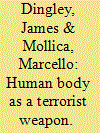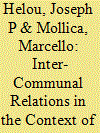|
|
|
Sort Order |
|
|
|
Items / Page
|
|
|
|
|
|
|
| Srl | Item |
| 1 |
ID:
142764


|
|
|
| 2 |
ID:
076948


|
|
|
|
|
| Publication |
2007.
|
| Summary/Abstract |
This article argues that a major factor in terrorist acts is an appeal to the actor's own community at an emotional and symbolic level, through acts of sacrifice, particularly self-sacrifice. Although other aims also exist, a prime concern is to recall the actor's home audience to the struggle, because the actor regards himself as acting on their behalf. This utilizes the imagery and symbolism of traditional religion, implying a strong communal and non-material impetus to terrorist acts, rather than rational material calculation, that modern Western man finds difficult to comprehend. It also recalls much classical social theory, which emphasized the central role of religion in community. Self-sacrifice tells an emotional story to the actor's community that is comprehensible to them and will have an emotional appeal to maintaining the community. For the Northern Ireland hunger strikes (possibly analogous to suicide bombers) this is reflected in their appeal solely to a Catholic/nationalist community that equates strongly with ideas of a pre-modern society under threat from a modernizing society. All the hunger strikers were very normal for their community, but left non-Catholics completely unmoved. Consequently there is a need to understand the communal dynamics behind terrorism if one is to effectively counter the threat and that different societies may have different values regarding the individual, community, and life itself. Individual motivations do not provide an adequate explanation for much terrorism and it is a failure to grasp this that severely hinders much counterterrorism
|
|
|
|
|
|
|
|
|
|
|
|
|
|
|
|
| 3 |
ID:
190239


|
|
|
|
|
| Summary/Abstract |
This paper explores why the production of communal fear via demographic and political-economic factors can explain group behavior (here the Maronites of Lebanon) in diverse ethnic, religious and sectarian plural societies rather than a strict reliance on structural and instrumental explanations. It argues that communal fear, deeply entrenched in political, socioeconomic and anthropological interpretations of groups’ fertility rates, migration patterns, land ownership and shares of industry and agriculture inter alia, can explain Maronites’ everyday practices of preferring land purchases in certain (ethno-religiously defined-) areas, occupying specific jobs and dominating certain economic sectors. While we acknowledge the role of individual cognition—Lebanese citizens’ ability—in breaking away from the clutches of group thinking, we find that many pervasive political, economic and social factors reaffirm group solidarity in plural societies; thus rendering useful the concept of communal fear in explaining how members of groups adopt everyday practices to hedge against perceived risks.
|
|
|
|
|
|
|
|
|
|
|
|
|
|
|
|
| 4 |
ID:
151855


|
|
|
|
|
| Summary/Abstract |
Looking at the relationship between tattooing and its past and present Islamic interpretations, this article presents the case of an old tattooing practice that transformed into a folk belief. Setting aside the antagonistic tension between tattooing as an adorning means and Islamic injunctions prohibiting tattooing, this article assesses the practice by reference to the ways it was recently encapsulated within a narrative of fashion, usage and custom. The study is based on multi-sited ethnographic fieldwork, participant observation and extensive interviews carried out with members of the Arab tribe Hatipogullari, living in five villages and on the hilly ‘arable field’ (Arap Bölgesi) near the town of Siverek, in the south-eastern Turkish province of Şanliurfa.
|
|
|
|
|
|
|
|
|
|
|
|
|
|
|
|
|
|
|
|
|